 Petzlover
Petzlover Coonhound is originated from United States but Komondor is originated from Hungary. Coonhound may grow 7 cm / 2 inches shorter than Komondor. Coonhound may weigh 26 kg / 57 pounds lesser than Komondor. Both Coonhound and Komondor has same life span. Both Coonhound and Komondor has almost same litter size. Coonhound requires Low Maintenance. But Komondor requires High Maintenance
Coonhound is originated from United States but Komondor is originated from Hungary. Coonhound may grow 7 cm / 2 inches shorter than Komondor. Coonhound may weigh 26 kg / 57 pounds lesser than Komondor. Both Coonhound and Komondor has same life span. Both Coonhound and Komondor has almost same litter size. Coonhound requires Low Maintenance. But Komondor requires High Maintenance
 The Coonhound, hailing from the United States of America, is a scenthound or hunting dog of which there are 6 distinct breeds which are recognized by the United Kennel Club.
The Coonhound, hailing from the United States of America, is a scenthound or hunting dog of which there are 6 distinct breeds which are recognized by the United Kennel Club.
Because foxhounds were regarded as inadequate for hunting, people started looking at the developlent of other hounds who had a keen sense of smell and the ability to track and animal effectively and without necessarily a human commanding it.
Foundation dogs were selected because of their keen sense of smell and Bloodhounds were also added to the Coonhound line to provide the Coonhound with superb tracking skills. Its precise origins are unknown but it is believed that many of the European hunting hounds were involved in its development as well as the Kerry Beagle and the FrenchBleu Gascogne hounds.
It was in 1912 that the first Black and Tans were registered with the United Kennel Club. In 1945 the American Kennel followed.
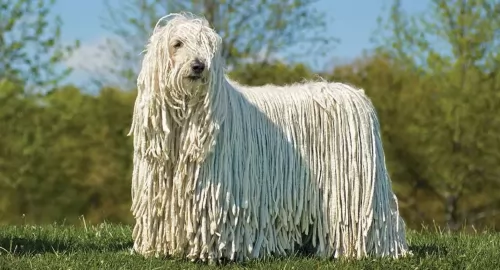 Looking like a giant mop, and sometimes being referred to as 'mop dogs' the Komondor, known also as the Hungarian sheepdog, hails from Hungary.
Looking like a giant mop, and sometimes being referred to as 'mop dogs' the Komondor, known also as the Hungarian sheepdog, hails from Hungary.
The dog was brought to Europe centuries ago so he is a well established breed. It has been declared as one of the country's national treasures.
He is a dog related to many other dogs such as the Pulim the Ovcharka, the Bearded Collie, Old English Sheepdog and others.
 Known also as the Black and Tan Coonhound, the Coonhound is a medium to large dog weighing 23–34kg and standing at 53-69cm. He makes an exceptional pet.
Known also as the Black and Tan Coonhound, the Coonhound is a medium to large dog weighing 23–34kg and standing at 53-69cm. He makes an exceptional pet.
He has a short, dense coat of black and tan in color with tan markings around the muzzle. He has long, floppy ears and a long tail. With his long, strong, muscled legs he is able to pick up speed when on the hunt. He is known for his deep, booming bark.
The Coonhound isn’t as jaunty as some other dog breeds but he is social, playful and friendly. He is even tempered and sensitive, and you’ll know when you’ve hurt his feelings as he gets a look about him of utter misery.
He definitely isn’t suited to apartment living and being left on his own, and is therefore not suited to an owner who works all day and leaves him on his own. They just love human companionship, and enjoy taking part in all the activities of their owner's life.
Early training and socialization will be necessary to ensure he grows up calm, obedient, relaxed and confident. When he has been socialized he makes an excellent family pet, getting on well with children as well as with other pets in the home.
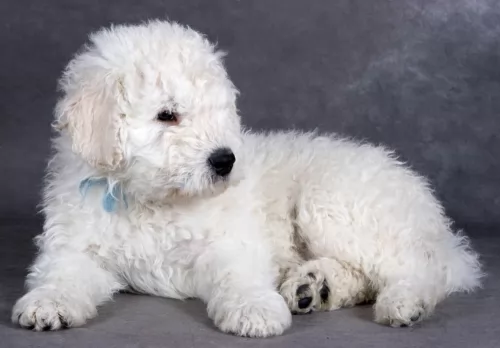 Known for his unique long corded, singular white coat, the Komondor, a molosser dog, is large. Females start at 64cm in height and both males and females can reach up to 76cm in height.
Known for his unique long corded, singular white coat, the Komondor, a molosser dog, is large. Females start at 64cm in height and both males and females can reach up to 76cm in height.
This unusual coat of theirs is wavy and actually forms cords or dreadlocks as the dog matures. You can't easily see the dog's face because of all the hair.You also can't see the tail easily, in fact you might think he hasn't got a tail as it is obscured by the hair. The tail is medium length and held low.
He has a large head, dark brown eyes, and floppy ears. The coat is certainly going to require grooming even though the dog doesn't shed much. His body is robust and well muscled with the body being slightly longer than the height of the dog.
The Komondor has been a dog used for guarding livestock, and while his character is calm and balanced, when the livestock is threatened, he can show another side – more aggressive – as he defends his flock. He makes an excellent watchdog.
He is an affectionate dog with his human family, being a gentle playmate of children. He is slightly reserved and wary of strangers, and is willing to guard and protect his human family from them.
He is also good with other family pets. When you look at him you might think of him as not being very energetic, but he is an athletic dog, fast and powerful. Because of his size and speed, it is best to have him trained and socialized as he can be obstinate. Training him makes him obedient.
 The Coonhound is often described as a carefree, happy-go-lucky type of dog breed who is social and who just loves to spend time with his human family.
The Coonhound is often described as a carefree, happy-go-lucky type of dog breed who is social and who just loves to spend time with his human family.
They just love their human family, and are full of mischievous tricks, being amusing and entertaining for the family.
He is a playful, gentle dog and he seems to keep his puppy nature much longer than with other dog breeds, but this is part of his appealing nature. He isn't a dog breed for everyone as some dog owners might want a more serious breed, but when trained and socialized, he promises to turn out to be an adored family pet.
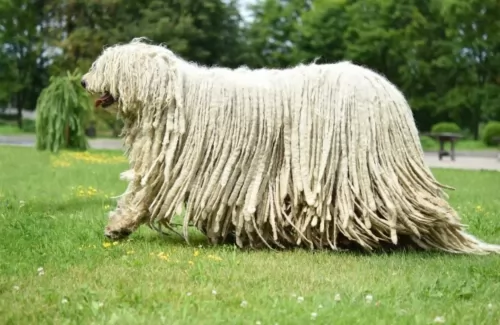 The Komondor is known for his strong guardian characteristics, especially with his human family. He is loving and loyal towards them while being wary of strangers.
The Komondor is known for his strong guardian characteristics, especially with his human family. He is loving and loyal towards them while being wary of strangers.
True, his coat can make people think twice before making this dog a pet, but if you're game and ready to attend to his coat, he can make an excellent family pet. They're fine with other pets too, and he is also an intelligent dog, capable of being easily trained.
He needs a good deal of exercise and can become noisy and destructive without the right amount of stimulation. If you do your part with the Komondor and provide him with a loving, caring home, he will be an awesome pet and guard you with his life.
 Coonhounds usually enjoy very good health, but they can still suffer with any one of the more common dog illnesses there are. They’ve got long ears so they are more prone to ear infections. Also, hip dysplasia has been recorded too.
Coonhounds usually enjoy very good health, but they can still suffer with any one of the more common dog illnesses there are. They’ve got long ears so they are more prone to ear infections. Also, hip dysplasia has been recorded too.
It is why so many breeders opt to have their dogs certified by the Orthopedic Foundation of America.
Ear infections in dogs with long ears are common and most dogs who suffer with an ear infection will scratch at the ears and shake their heads. There can also be redness in the ear.
Mites, bacteria and yeast are all common problems, and your veterinarian can treat it and show you how to clean the dog’s ears to keep them free from infection in the future.
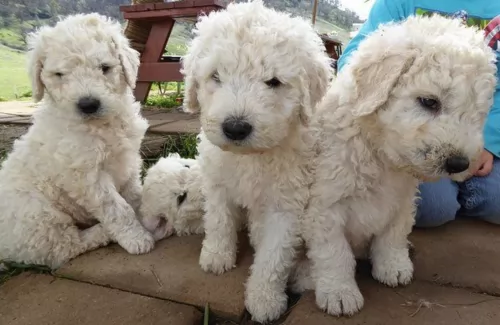 The Komondor is a healthy dog breed who can live to be 10, 11 or 12 years if you look after him well. There aren't any known genetic disorders prominent with the dog, but it pays to know about some of those that could strike -
The Komondor is a healthy dog breed who can live to be 10, 11 or 12 years if you look after him well. There aren't any known genetic disorders prominent with the dog, but it pays to know about some of those that could strike -
This is an irritating eye problem where the eyelash rubs up against the eyes.The result can be scratching of the cornea and eye infections. It is an eye problem which can be corrected with surgery.
Hip dysplasia is a serious genetically inherited disorder and common in large dog breeds. It is caused by a malformation of the hip joint. It can cause problems for the dog, weakening the hip and making it incapable of supporting the weight of the dog.
It also leads to pain for the dog, difficulty with moving and even total lameness. Weight, size of dog, age and genetics are all factors which can increase the dog's likelihood of developing hip dysplasia.
Whimpering, lethargy and refusing to put weight on the leg are common signs of hip dysplasia and your vet will go ahead with ways to relieve the pain and symptoms of your Komondor.
 Your Coonhound will want a lot of exercise. While you keep him on a leash when walking him or allowing him to run while you cycle, he’ll also want a place where he can run off the leash.
Your Coonhound will want a lot of exercise. While you keep him on a leash when walking him or allowing him to run while you cycle, he’ll also want a place where he can run off the leash.
Even though the Coonhound is a short haired dog, he does shed. Making use of a rubber curry brush, brush him down twice a week to maintain his beautiful black, velvety coat.
Because he is an athletic outdoor dog, he may be more prone to picking up ticks and fleas and there are excellent shampoos available that keep these parasites at bay for a good many days.
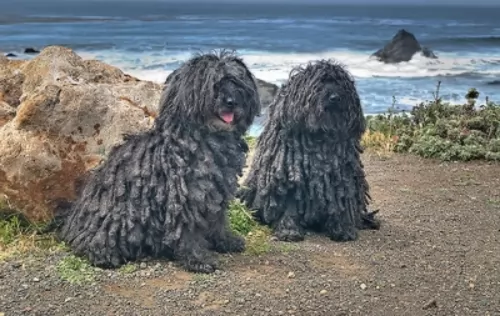 The Komondor is most certainly not a low maintenance dog with that extraordinary coat.Before the dog turns 1, the coat begins to form its cords. These cords can become discolored and matted, In fact the cords will need to be separated to keep the dog clean and free of matted hair.
The Komondor is most certainly not a low maintenance dog with that extraordinary coat.Before the dog turns 1, the coat begins to form its cords. These cords can become discolored and matted, In fact the cords will need to be separated to keep the dog clean and free of matted hair.
For those who keep the dog as a pet and who don't want him to be a show dog, he can be trimmed, otherwise the coat and its maintenance could turn out to be a real issue.
Of course once the distinctive coat has been sheared, he loses that typical and recognizable Komondor look.
Check his ears on a regular basis for wax- and dirt buildup so as to prevent ear infection.
Teeth need to be checked regularly to prevent tartar buildup and if you don't have the time or the knowledge to keep his teeth clean and maintained, take him to the vet as the teeth-treatments they do there will promote healthy teeth and gums.